Will Information Abundance Lead to Value Deflation?
According to Search Engine Land, Google began rolling out its AI search results to non opted-in users on March 22, 2024. Google’s generative search results are officially known as Search Generative Experience (SGE). Before March 22, these AI generated results were only available to people who opted in.
With SGE, Google (and Bing via its “deep search”) is providing answers to a person’s query directly in the search results, while also providing a few links for users to explore within the generated result. Traditional organic results are usually below this AI response. Ads are sometimes above and sometimes below.
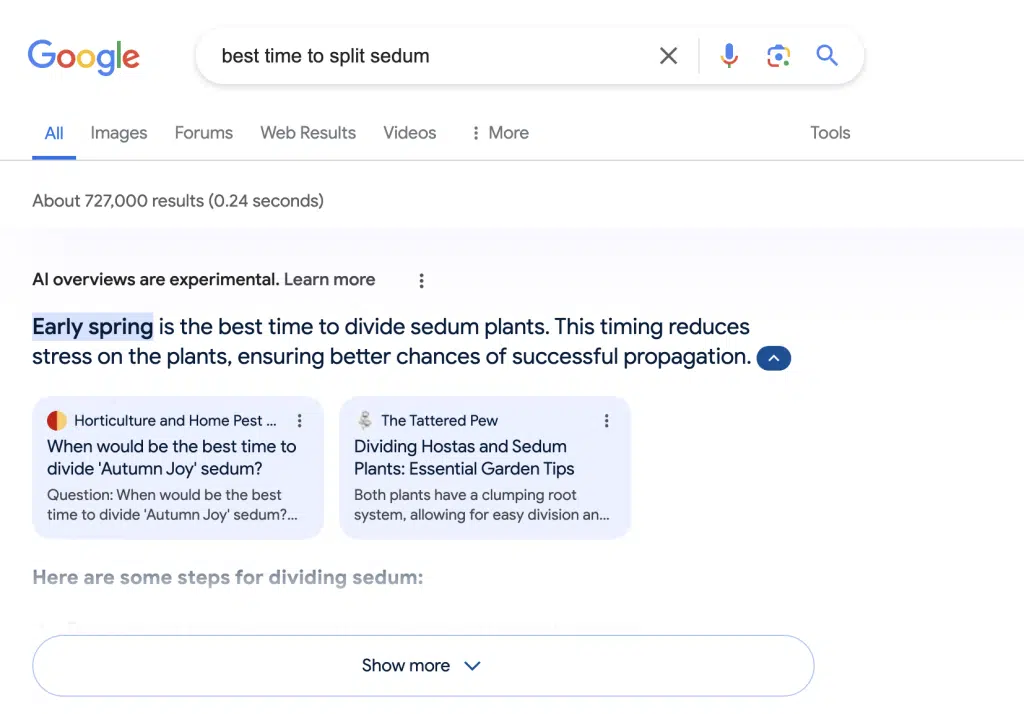
As you can see in the result above, Google provides an answer to my question about the best time to divide sedum; early spring. The odds of me (or anyone) clicking the result is much lower than a traditional SERP with 10 blue organic links. Multiply this across billions of queries and you start to see a world where websites get less traffic.
Generative search’s potential impact on CTR (and traffic)
Google’s rollout of Generative Search will be slow at first — it’s currently only 2% of US-based users. However, it will likely accelerate as they get feedback from billions of searches. This new search experience will be a revolution in how users interact with search results, potentially altering traditional clickthrough rate (CTR) patterns. Generative AI responses as search results will provide answers directly in response to queries. This means that users will likely get their answers without needing to click through to a website. One study published in Search Engine Land is predicting an 18 to 64% decrease in organic clicks due to generative search.
As users become accustomed to receiving comprehensive answers directly from Google’s Generative Search, their behavior might shift away from exploring multiple sources. This could lead to a decrease in clicks across the board but might increase engagement with the search engine itself.
How generative AI will impact different types of Queries
- Impact on Featured Snippets and Knowledge Panels: If Generative Search effectively replaces or enhances featured snippets (see above sedum example) by providing even more contextually rich and synthesized responses, it could either cannibalize their clicks or redistribute clicks depending on how these answers are integrated. For CTR, we could chalk this up as a wash.
- Effect on Search Ads: The impact on CTR for search ads is a crapshoot. Google will likely be experimenting with ad placement during the rollout, which will impact CTR. If users find answers without clicking on organic results, ads positioned near the top of the page might either see increased visibility or decreased effectiveness, depending on how generative content changes user attention dynamics. Effect of CTR… TBD.
- Navigation and Transactional Queries: For queries with a clear intent to visit a specific site or make a purchase, the impact might be less pronounced. If you’re searching Google for a company’s website, Generative search is much slower and less helpful. However, if Generative Search starts providing product comparisons directly in the search results, it could influence how users make decisions, potentially affecting clicks to individual e-commerce sites.
- Long-Tail Queries: Generative Search will be at its best when answering long-tail queries by generating specific answers that were previously hard to find in a Google search. This could increase user reliance on Google for niche information, potentially reducing clicks to specialized sites that would typically benefit from long-tail search traffic. The effect of generative AI on this category of searches could be catastrophic, potentially 50-90% reduction in CTR.
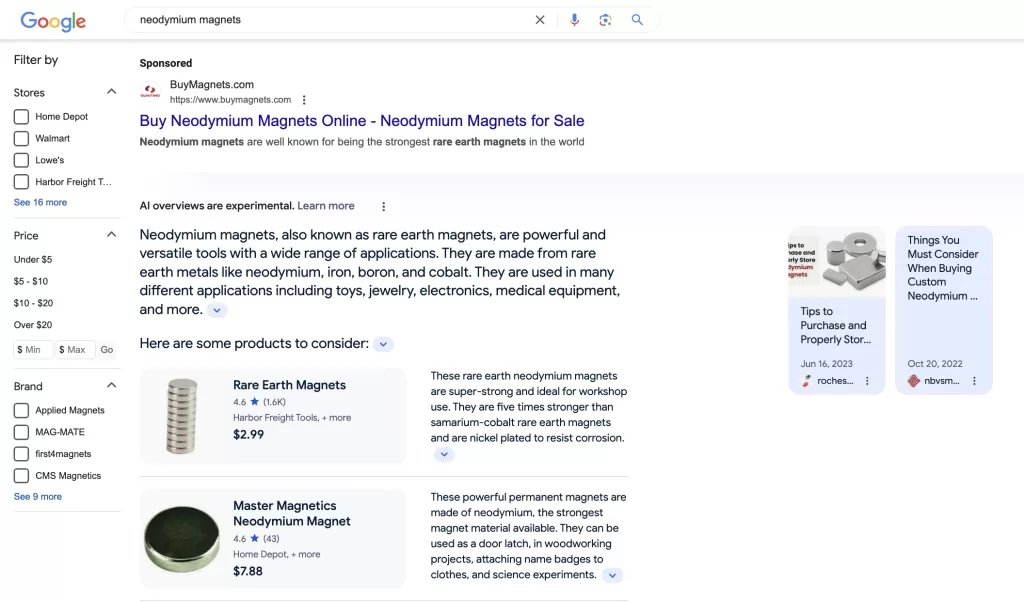
Dissecting SGE’s impact on a specific query, ‘best hiking in costa rica’
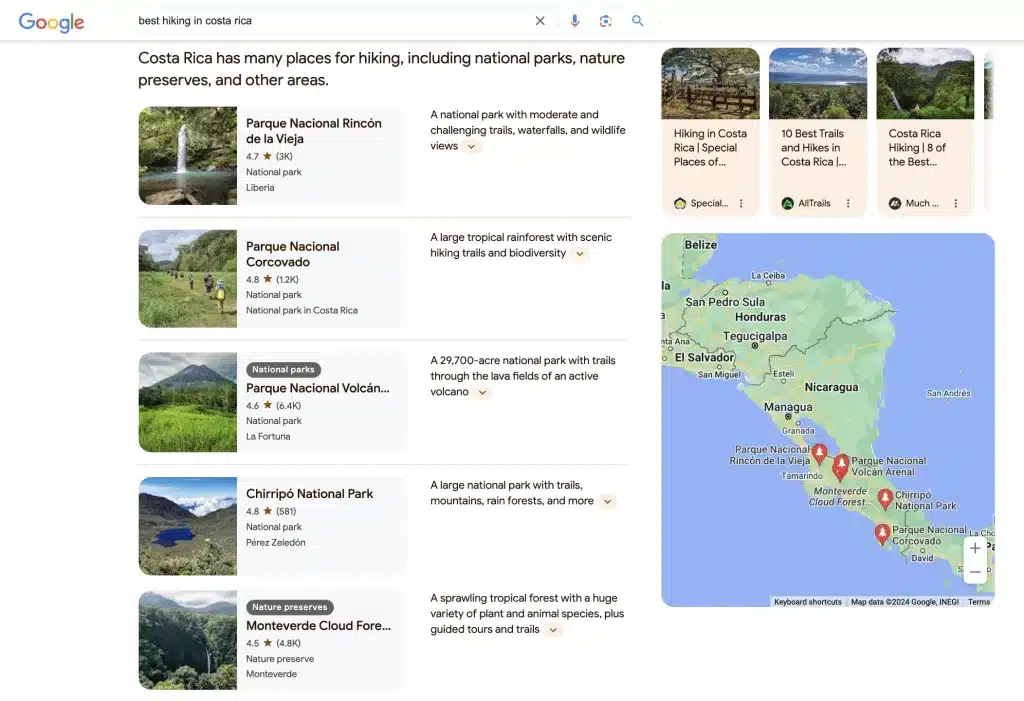
In the above screenshot, you can see how robust the generated AI result is. We see a list of locations on the left that link to places on Google maps. On the right we have a carousel of organic results, with a map below that reflects the locations seen on the left.
A rough estimate of the SERP real estate here is about 80% being Google-owned properties, with about 20% dedicated to the organic carousel in the top right. The carousel results will still likely have relatively high CTRs, let’s estimate around 10-15% for the first three that are visible.
Hidden below the generative results are search ads, followed by the old school organic results. Punching in at #2 is one of our clients.
- They’re currently getting a 32% CTR sitting in that spot
- They do show up in the generative carousel, but at number 5, meaning you need to scroll to the right in the carousel to find them
In a world where Google is showing generative results to most users, I do not see a future where our client is able to hold onto a 32% CTR for this query. Multiply this same phenomenon across the tens of thousands of queries they rank for and it can start to look bleak.
Could SGE lead to higher search engagement and more total queries?
In our original article speculating on AI’s impact on SEO, we noted that during the shift to mobile devices, people speculated that searches would decrease. In reality, searches skyrocketed due to changes in people’s habits over time. I’m old enough to remember how novel it was to be able to Google something away from your computer. This novel behavior quickly became the norm.
There could be a similar scenario with AI. Our behavior changes in some unpredictable way that leads to even more Google searches per person per day. Sure, CTRs plummet, but searches increase.
Even if that happens, I believe websites will net less traffic overall. Need proof? I don’t have any, but I do have some very speculative back-of-the-napkin math:
- AI results in 3x searches per day, and
- AI leads to 80% reduction in average CTR
- This leads to an overall reduction in organic web traffic of 40%
Of course, change any of those numbers and the outcome changes dramatically. In a post-SGE world, Google will likely benefit, but it’s the websites who rely on organic clicks that are likely to feel the sting.
Could content in the AI era suffer from hyperinflation
If written content generates less traffic in the future, then each piece of written content will have less value. If the value of content continues to drop, will there still be an incentive to write articles? In the medium term, there could be a rush to create more content to sustain traffic. Thousands of sites could lean harder on AI and writers to create metaphorical wheelbarrows of articles to generate the same revenue they once generated from one article. But unlike the Germans of the 1920s with their paper currency, we won’t be able to burn our digital content to keep warm. Instead, that same content will be fueling more and more powerful AI results.
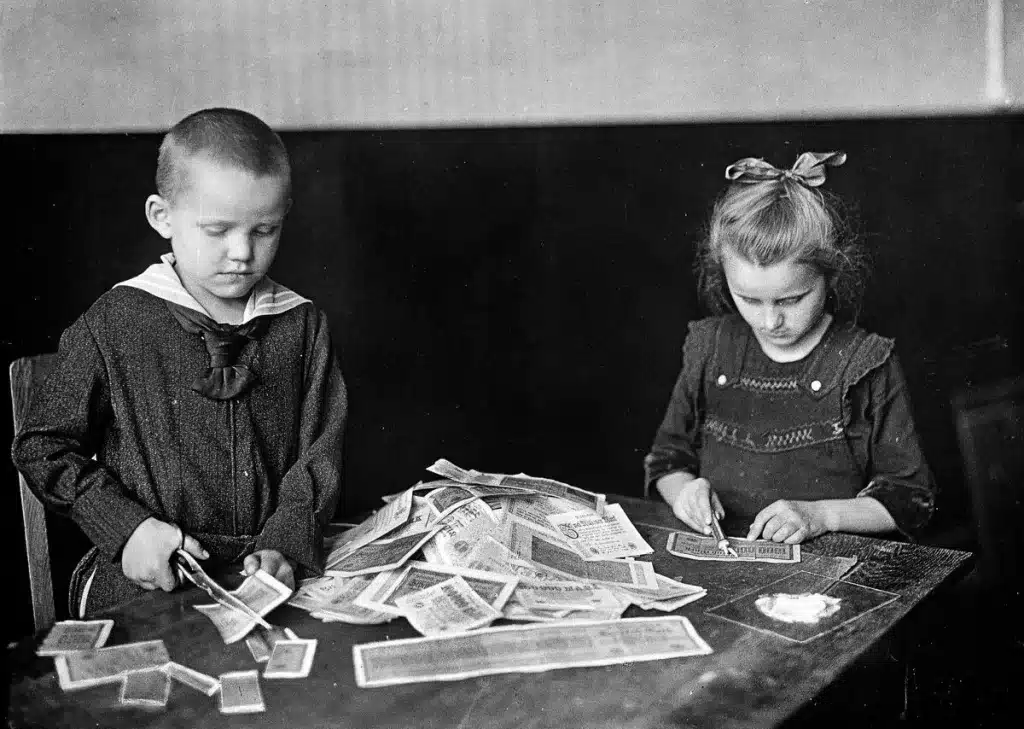
Eventually, the value of certain types of content could decrease to near zero. When that happens, will people still be incentivized to create? When people stop earning traffic from articles, that means they’ll also stop earning revenue. Will the cycle still continue working without the traffic incentive?
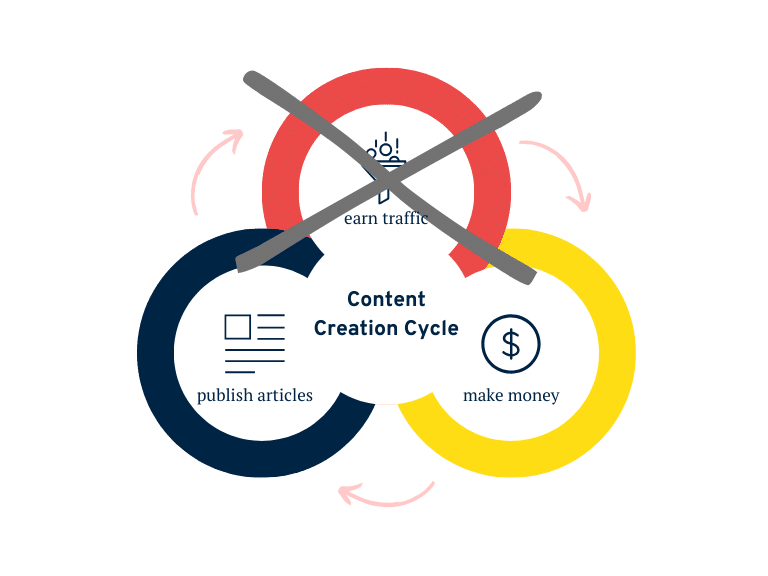
The ad supported Internet looks weaker in this future
Traffic is the lifeblood of the ad supported Internet. AI could disrupt an entire industry of ad-supported websites. Especially for websites that have been spun up with the sole purpose to get money from display ads. That result could be the silver lining of AI’s effect on web traffic. The death of thousands of low-quality websites created to rank for “10 best vacuum cleaners.” Of course, many legitimate media companies will be impacted as well, but they will at least have a dedicated readership to fall back on.
If overall traffic to websites is gobbled up by AI chatbot engagement, could that lead to inflated values for display ad impressions? If most of the garbage ad-supported websites crumble and only the high-quality remain, I know that our PPC team would probably be willing to spend more per click from those same ads.
How deep will the ripple of AI be on how we all browse the web?
There has certainly been a lot of speculation on my behalf, but one thing I can’t get past is the fact that people will still want to visit websites. Yes, AI could replace search as the middle layer between what I’m looking for and the website that has what I need. But eventually, if I need to buy a pair of shoes, I’m going to end up on a site that sells shoes. What happens between me initially wanting shoes and me buying shoes, well, that’s entirely up in the air.




